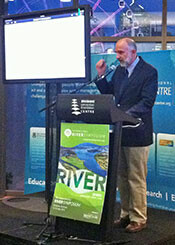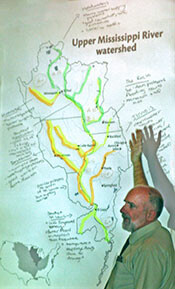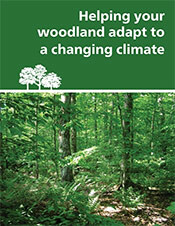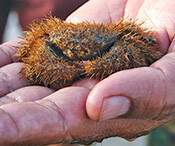International Riversymposium
 Bill Dennison and Heath Kelsey attended the International Riversymposium in Brisbane, Australia, September 23-25. Bill hosted a session on Ecosystem Health Report Cards and Heath presented IAN's work with the Nature Conservancy and other partners on the Mississippi River Report Card. Bill also launched the book Dancing with Dugongs which reflects on the lifetime of research and education achievements of Peter Oliver and Bill. Peter sadly passed away in November 2012. Other standouts of the symposium included excellent keynote talks from Karlene Maywald, Jeremy Bird, Jianchu Xu, Rohan D'Souza, Robert Costanza, and Stuart Orr. Contestants for the Australia and international River prizes were all excellent. The Australia River Prize went to the Glenelg River, and the International Riverprize went to the Mara River in Kenya.
Bill Dennison and Heath Kelsey attended the International Riversymposium in Brisbane, Australia, September 23-25. Bill hosted a session on Ecosystem Health Report Cards and Heath presented IAN's work with the Nature Conservancy and other partners on the Mississippi River Report Card. Bill also launched the book Dancing with Dugongs which reflects on the lifetime of research and education achievements of Peter Oliver and Bill. Peter sadly passed away in November 2012. Other standouts of the symposium included excellent keynote talks from Karlene Maywald, Jeremy Bird, Jianchu Xu, Rohan D'Souza, Robert Costanza, and Stuart Orr. Contestants for the Australia and international River prizes were all excellent. The Australia River Prize went to the Glenelg River, and the International Riverprize went to the Mara River in Kenya.
Upper Mississippi River Basin kickoff workshop
 IAN staff traveled to Moline, Illinois for the first of six sub-basin workshops for the Mississippi River Report Card project. This workshop focused on the Upper Mississippi River Basin, which stretches from Minnesota and Wisconsin in the north to St. Louis, Missouri in the south, and from Chicago in the east to Des Moines, Iowa in the west. The two-day workshop brought together experts from natural resource science and management sectors, but also engineering and economic sectors. Workshop participants helped determine indicators that would be used to address the six goals (flood risk, transportation, ecosystems, economies, water supply, and recreation) of the Mississippi River report card. This report card is part of the America's Watershed Initiative.
IAN staff traveled to Moline, Illinois for the first of six sub-basin workshops for the Mississippi River Report Card project. This workshop focused on the Upper Mississippi River Basin, which stretches from Minnesota and Wisconsin in the north to St. Louis, Missouri in the south, and from Chicago in the east to Des Moines, Iowa in the west. The two-day workshop brought together experts from natural resource science and management sectors, but also engineering and economic sectors. Workshop participants helped determine indicators that would be used to address the six goals (flood risk, transportation, ecosystems, economies, water supply, and recreation) of the Mississippi River report card. This report card is part of the America's Watershed Initiative.
Helping your woodland adapt to a changing climate
 As Maryland's climate changes, your woodland may be more susceptible to natural disturbances such as storms, droughts, insect and disease outbreaks, or other stressors that can damage trees or slow their growth. As a good woodland steward, now is the time to make smart environmental and economic decisions, and implement the most effective strategies to help your woodlands adapt to climate change. This guide explains the potential impacts of climate change in Maryland and how they may affect your woodland. Management options are described for each of these climate change impacts to reduce or avoid loss of forest cover, declines in forest productivity, and reductions in the environmental benefits of woodlands.
As Maryland's climate changes, your woodland may be more susceptible to natural disturbances such as storms, droughts, insect and disease outbreaks, or other stressors that can damage trees or slow their growth. As a good woodland steward, now is the time to make smart environmental and economic decisions, and implement the most effective strategies to help your woodlands adapt to climate change. This guide explains the potential impacts of climate change in Maryland and how they may affect your woodland. Management options are described for each of these climate change impacts to reduce or avoid loss of forest cover, declines in forest productivity, and reductions in the environmental benefits of woodlands.
IAN returns to India for integrated coastal zone management workshops
 In the second collaboration with the National Centre for Sustainable Coastal Management (NCSCM) and as part of the Integrated Coastal Zone Management project in India, an IAN team visited the State of Gujarat in early September to conduct two workshops: 1) the Coastal Ecosystem Health Report Card for the Marine National Park workshop in Jamnagar, and 2) the Gulf of Kachchh Cumulative Environmental Impact Assessment Framework workshop in Gandhinagar. A field day at the Marine National Park gave the IAN staff a chance to see first-hand some of the tidal zone and coral reef biodiversity that is the focus of the ecological report card.
In the second collaboration with the National Centre for Sustainable Coastal Management (NCSCM) and as part of the Integrated Coastal Zone Management project in India, an IAN team visited the State of Gujarat in early September to conduct two workshops: 1) the Coastal Ecosystem Health Report Card for the Marine National Park workshop in Jamnagar, and 2) the Gulf of Kachchh Cumulative Environmental Impact Assessment Framework workshop in Gandhinagar. A field day at the Marine National Park gave the IAN staff a chance to see first-hand some of the tidal zone and coral reef biodiversity that is the focus of the ecological report card.